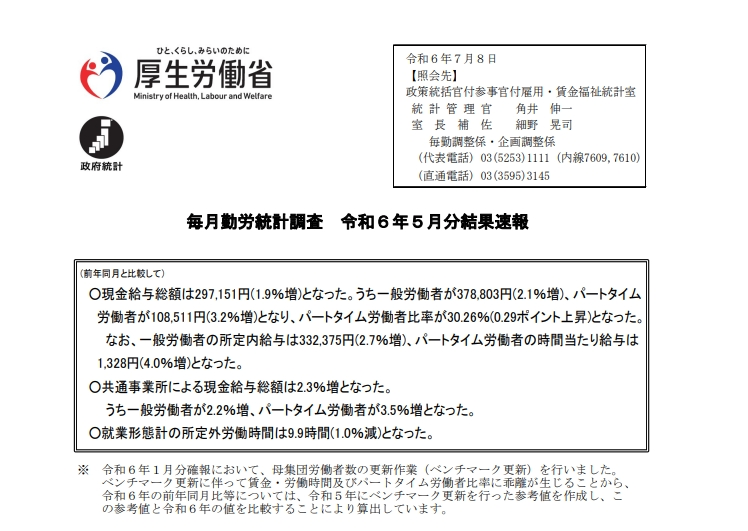Bank of Japan rate hike remains a mystery despite record base wage growth
While real wage growth in Japan, net of inflation, remains negative, that situation is likely to be reversed in July.
On July 8th, data released by Japan's Ministry of Health, Labour and Welfare showed that basic wages in Japan increased by 2.5% year-on-year in May, marking the fastest growth since 1993.
According to official statistics, a more stable indicator, which excludes bonuses and overtime pay for full-time employees, surged by 2.7% year-on-year, setting a new historical record and further confirming the significant improvement in Japan's overall wage trend.

Previously, Japan's largest labor union had forecast an average wage increase of 5.1% for this year, the largest since 1991. The substantial increase in basic wages for Japanese workers indicates that the significant pay raises obtained by companies during the "spring struggle" are gradually being passed on to households.
The data has bolstered market confidence in the formation of a virtuous cycle between wage growth and consumption, a dynamic seen as a catalyst for demand-driven inflation. If this trend continues, it will lay a solid foundation for the Bank of Japan to adopt a tightening monetary policy again after its first rate hike in 17 years in March.
However, in terms of real income, due to the weak yen and rising commodity prices pushing up import costs, real wages adjusted for inflation have recorded a record decline for the 26th consecutive month, complicating the Bank of Japan's efforts to normalize monetary policy. Based on the current wage growth, the central bank has already found a basis for raising interest rates later this month.
Yoshimasa Maruyama, Chief Market Economist at SMBC Nikko Securities, said: "Although Japan's real wages after inflation are still negative, the situation may be reversed in July." There are already signs that Japan's worsening labor shortage is leading to broader wage increases.
For future monetary policy, analysts say that Bank of Japan officials will face pressure at the meeting later this month. Although one-third of economists expect a rate hike at the meeting, other weak economic data in Japan and the inflationary risks brought by the yen's depreciation add complexity to the central bank's decision-making—last week, the yen hit a 38-year low, intensifying market concerns that maintaining the policy interest rate could lead to further depreciation of the yen.
In addition, economists also question the strength of Japan's economic rebound in the April-June period, especially after the safety certification scandal led to a decline in car production in the first quarter, weakening the rebound expectations. Dai-Ichi Life Research Institute and NLI Research Institute predict that Japan's second-quarter GDP growth rate may be below 2% on an annualized basis.
NLI points out that despite the risk of a rate hike this month, any rate hike would be inappropriate against the current economic data backdrop, and the Bank of Japan faces a severe test in its interest rate decision-making.
For a long time, the Japanese economy has been committed to breaking the shadow of deflation. The significant increase in wage growth has injected new vitality into the economy. Strong wage growth not only helps to increase household income and promote consumption but also stimulates corporate investment. More importantly, it provides the Bank of Japan with more policy maneuvering space, allowing it to gradually normalize monetary policy while controlling inflation.
·Original
Disclaimer: The views in this article are from the original Creator and do not represent the views or position of Hawk Insight. The content of the article is for reference, communication and learning only, and does not constitute investment advice. If it involves copyright issues, please contact us for deletion.